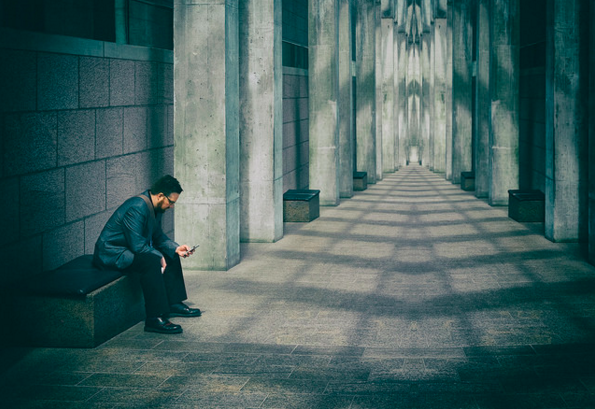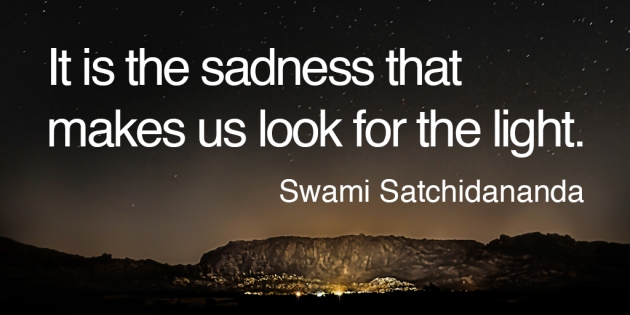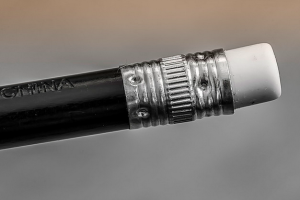
When I was growing up, phones were tethered to the wall by windy cords prone to tangling. Later, during some years I can’t quite pinpoint, the “cordless” era meant you could roam all around the house (and even into the backyard!) to have a conversation.
These days the general consensus is that we’ve evolved past the primitive days of phone cords and busy signals into an advanced technological era ruled by smartphones that connect us to everything we could possibly need: social media feeds, the news, games, the internet, music, stores, and yes, even the telephone.
But for people who are depressed or down in particular, phones can be insidious devices that amplify feelings of loneliness, separation, and hopelessness. With faces lit up by the blue of a tiny screen, our hearts yearn for something we can’t find in an app.
Earlier this year, while suffering from depression, I realized that the phone I kept next to me all day long didn’t make me feel connected to anyone or anything: it actually made me feel disconnected from myself and the people around me. I’d look to it for relief from sadness only to find that my social media feeds made me feel inadequate, my text messages were not as numerous as I thought they should be, my last ten emails were from retailers announcing some kind of sale.
Over the past few months, I’ve tamed my smartphone by making some fairly simple but important adjustments.
If you’re feeling like your phone rules your life or if you’re noticing that your phone enhances negative feelings of depression or loneliness, here are some ways you can take ensure that your phone supports your well-being.
Shut Down Notifications
Your phone, if not managed, is like an infant constantly screaming for your attention. You have an email. Your mother just texted you. Something is happening on Facebook.
There are two problems with this constant stream of alerts. First of all, the interruptions make it hard to focus on the people around you. Even if, while at lunch with a friend, I put my phone away, if it’s there in my purse lighting up, I may still, perhaps unconsciously, feel drawn into its force field, wondering what I might be missing, pulled away from the present moment. Second, if we have notifications set up and we have an day when we don’t receive any, we may start to feel bad that no one is contacting us.
The best solution I’ve found is to be ruthless with alerts and turn off notifications. This means that I don’t have a circular red badge highlighting various apps. Instead, I check my email at my own convenience. Same for social media feeds. For text messages, I do allow the badge to alert me to a new message because I want to receive messages with immediacy, but I don’t have new messages pop up on my screen.
This is a simple modification that’s incredibly freeing.
Delete or Bury Stress-Inducing Apps
Social media, particularly when I’m depressed, makes me feel terrible. The live feeds broadcasting other people’s best moments only cause me to judge myself and my depression more harshly because it looks as if everyone I know is simply delighted while I’m in the dark.
What I’ve done is to delete social media feeds from my phone. Try it. Or, if that seems too extreme, bury them in a folder a few screen swipes over. Audit all of your apps and ask yourself: do I really need this? Does it make me feel happy or stressed out? Delete accordingly.
Download Healthy Apps and Put them Front and Center
There are so many apps that encourage well-being. Some of my favorites are Insight Timer for meditation, Pacifica for mood monitoring and connecting to others to talk about mental health, my Jawbone app to track my steps and sleep, Stitcher to listen to podcasts, and Pocket to read bookmarked articles. I also like Wunderlist to keep track of my to dos and Balance to work on building healthier habits.
On your home screen, feature all of the apps that play a role in helping you stay healthy.
And one last tip, especially if you’re feeling down or depressed: dare to turn off your phone and force yourself to see other people in real life, or IRL as the kids say. As much as you want to curl up in bed and spoon your phone, you’re better off seeing a friend for dinner, finding a meet up to attend, or going to a support group.


 If you’re sick with a cold or the flu or, God forbid, cancer, you don’t expect that you’ll be able to do all of the things you can do when you are well. The same goes with mental illness. You can’t expect, as a depressed person, or even a semi-depressed, melancholic person, to be getting everything done.
If you’re sick with a cold or the flu or, God forbid, cancer, you don’t expect that you’ll be able to do all of the things you can do when you are well. The same goes with mental illness. You can’t expect, as a depressed person, or even a semi-depressed, melancholic person, to be getting everything done.
 I just walked out of the apartment and ran into my super on the sidewalk. He looked at me, confused, like I was some kind of puzzle he couldn’t figure out.
I just walked out of the apartment and ran into my super on the sidewalk. He looked at me, confused, like I was some kind of puzzle he couldn’t figure out.